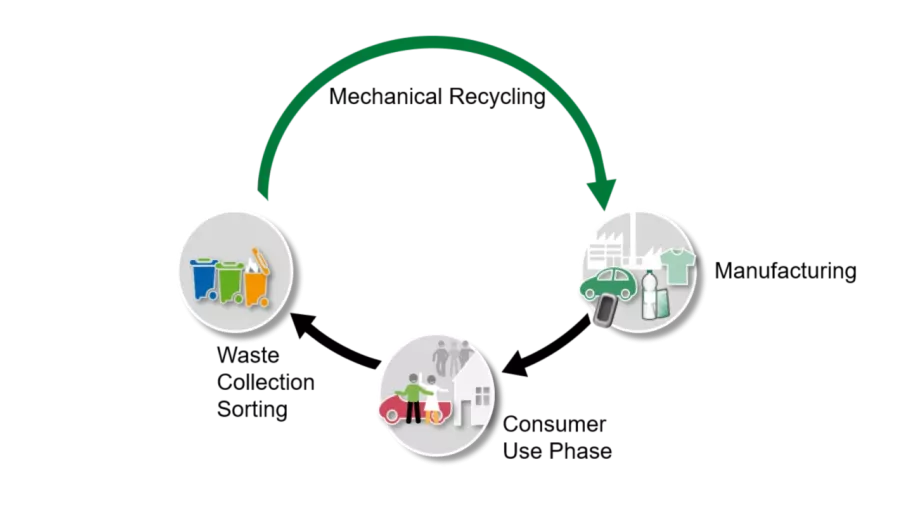MECHANICAL RECYCLING
Mechanical recycling is the processing of plastic waste into secondary raw material without significantly changing the chemical structure of the material.
TARGET USERS: Industry, Government
KEY CONSIDERATIONS: Transitioning to a circular economy that retains plastic in its highest value condition is essential to reduce environmental impacts, promoting reduction, reuse, and recycling.
-
 Eurex Energy Solution
Eurex Energy SolutionMechanical recycling
- in the recycling sectionMechanical recycling is the process of reusing previously used materials and products (eg, recycling paper, non-ferrous and other metals, glass, plastics, tires, etc.). Recycling prevents waste of resources, reduces the consumption of raw natural materials, reduces the amount of stored waste and reduces energy consumption, thus contributing to the reduction of greenhouse gas emissions compared to the use of raw materials.
Plastics make up less than 8% of waste by weight, but much more by volume, which is especially important in landfills, where volume is more important than weight. Plastics are produced mostly from non-renewable oil, the reserves of non-renewable oil are estimated for 40 years. During its transport alone, 3.5 million tons per year leak into surface waters. The biological decomposition of plastics in nature or in landfills is long-lasting, it takes several decades. When some types of plastics are burned, harmful substances escape into the air.
-
 Mechanical recycling moves the circular economy
Mechanical recycling moves the circular economyPlastic Waste Recycling
Mechanical recycling is an essential component of the circular economy. It can be applied to various material classes like plastics, lithium-ion batteries for electric vehicles, or metals. End-of-life materials can be processed via collecting, sorting, shredding, melting and transforming it into secondary raw materials for a new application. Manufactured from recycled material, the article enters its new use-phase before the next end-of-life management.
For plastic waste, mechanical recycling is the preferred recycling solution if ecologically most beneficial, technologically possible, and economically attractive. Chemical recycling will complement mechanical recycling.
But there is more than plastics: BASF also engages in the recycling of precious metals and lithium-ion batteries for electric vehicles. Find out more below.
Mechanical Recycling
Mechanical recycling of plastics refers to the processing of plastics waste into secondary raw material or products without significantly changing the chemical structure of the material. In principle, all types of thermoplastics can be mechanically recycled with little or no quality impairment.
Before recycling, most plastics are sorted according to their resin type. In the past, plastic reclaimers used the resin identification code (RIC), a method of categorization of polymer types, which was developed by the Society of the Plastics Industry in 1988. Polyethylene terephthalate, commonly referred to as PET, for instance, has a resin code of 1. Most plastic reclaimers do not rely on the RIC now; they use various sorting systems to identify the resin, ranging from manual sorting and picking of plastic materials to mechanized automation processes that involve shredding, sieving, separation by rates of density i.e. air, liquid, or magnetic, and complex spectrophotometric distribution technologies e.g. UV/VIS, NIR, Laser, etc. Some plastic products are also separated by color before they are recycled.
After sorting, for mechanical recycling the plastic recyclables are then shredded. These shredded fragments then undergo processes to eliminate impurities like paper labels. This material is melted and often extruded into the form of pellets which are then used to manufacture other products. The highest quality purification may be referred to as “regeneration”.
Technology
ABOUT US
we are on social NETWORK
Eurex Energy, s.r.o. capitalized on its own development using foreign knowledge and experience in the production of new technology in the use of renewable and alternative energy sources, the EUREX ECO 01 equipment for the recovery of mixed waste plastics in the form of chemical recycling.ed.


